Unit 4 Humor Topic Talk课件(共37张PPT,内镶嵌音频,)北师大版(2019)选择性必修第二册
文档属性
| 名称 | Unit 4 Humor Topic Talk课件(共37张PPT,内镶嵌音频,)北师大版(2019)选择性必修第二册 | 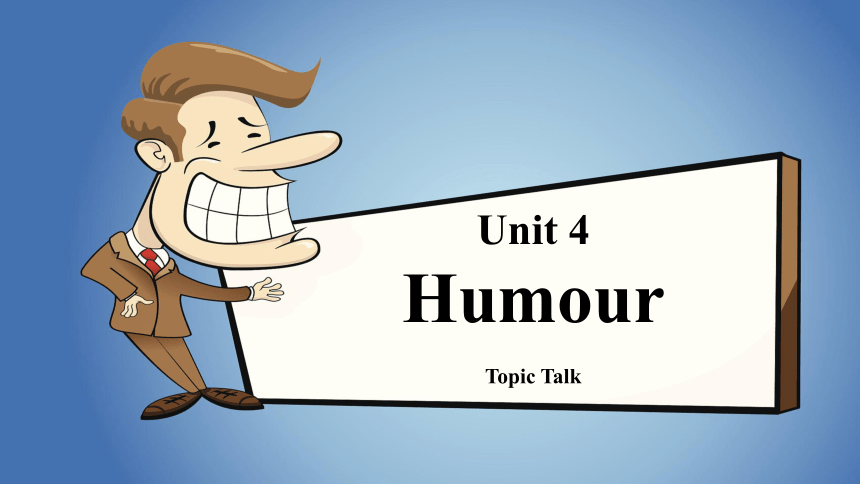 | |
| 格式 | pptx | ||
| 文件大小 | 30.4MB | ||
| 资源类型 | 教案 | ||
| 版本资源 | 北师大版(2019) | ||
| 科目 | 英语 | ||
| 更新时间 | 2025-08-01 11:05:46 | ||
图片预览

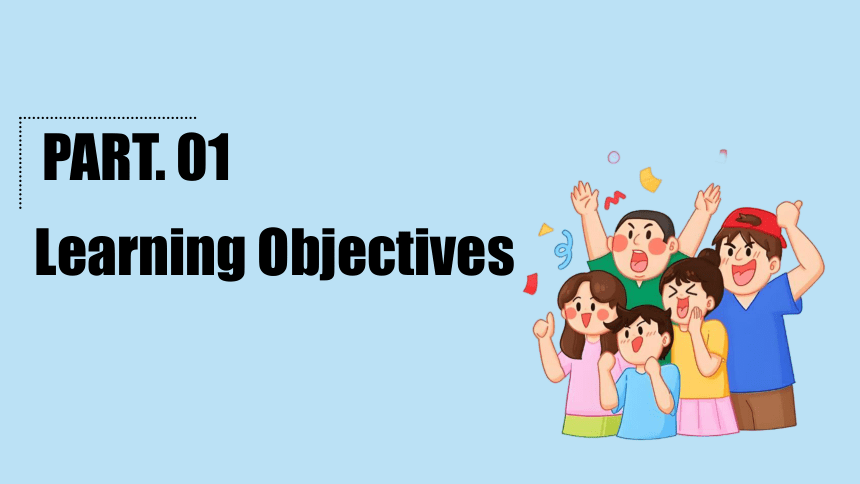
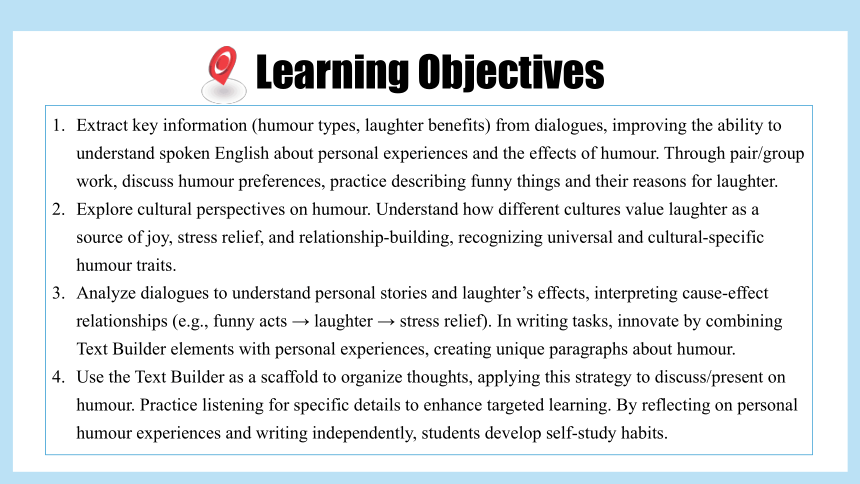
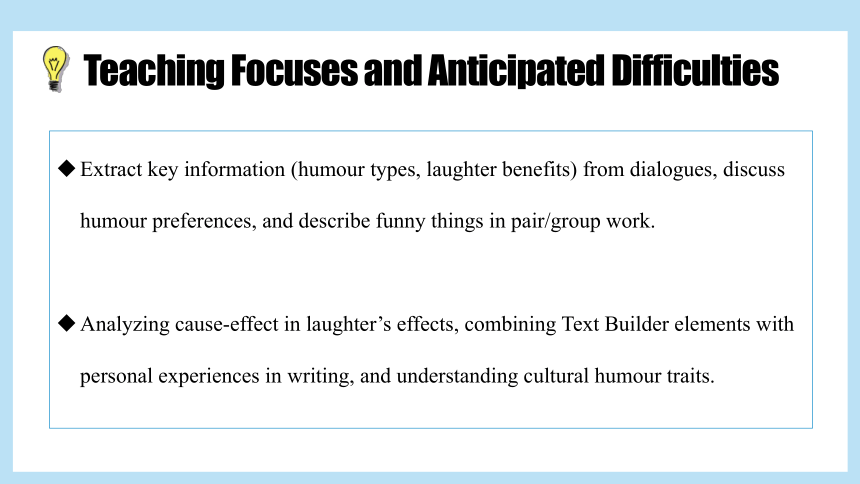
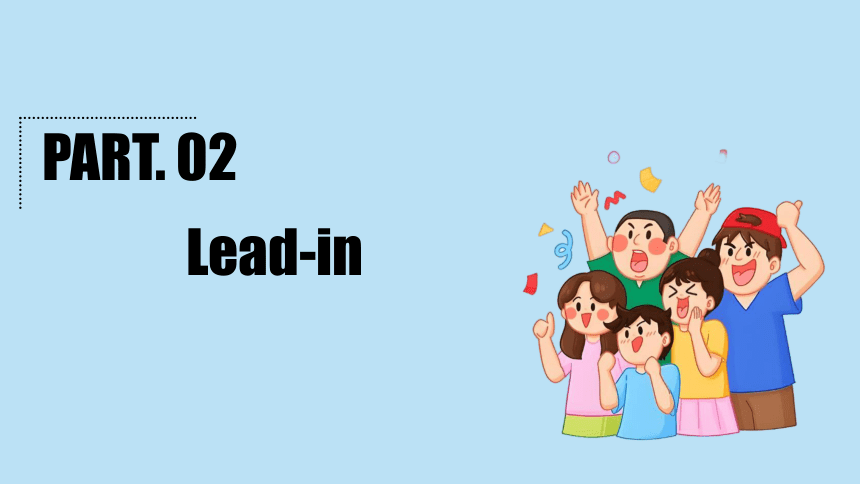
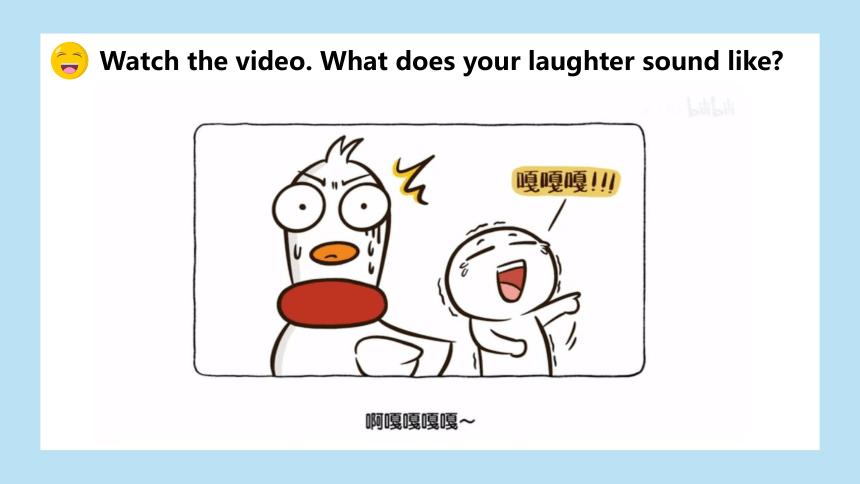
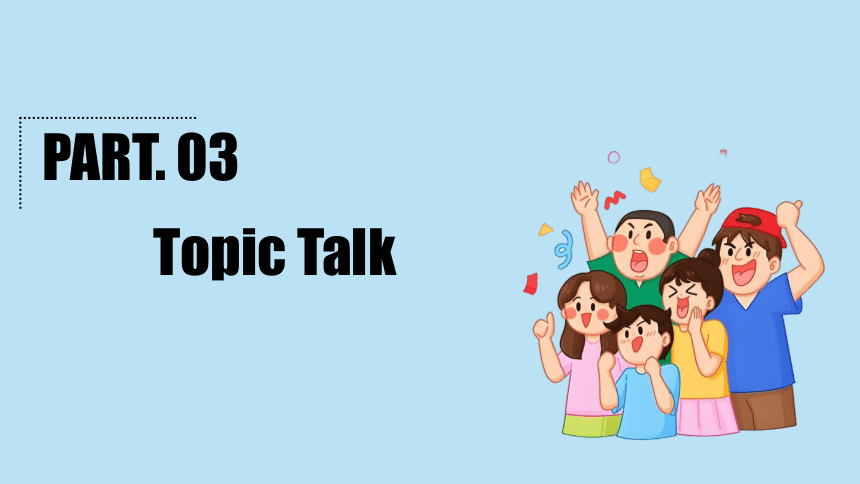
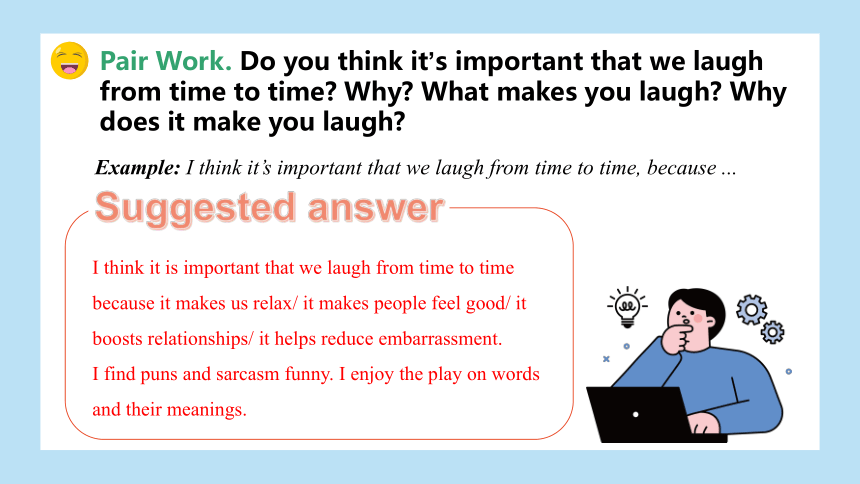
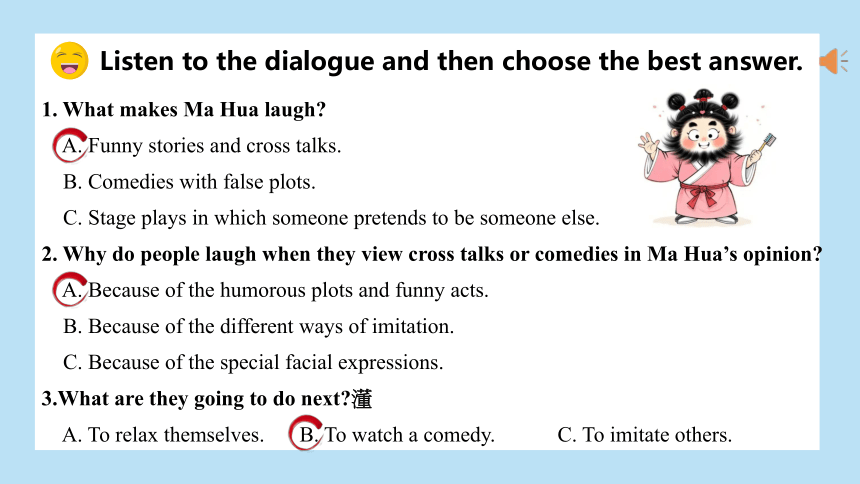
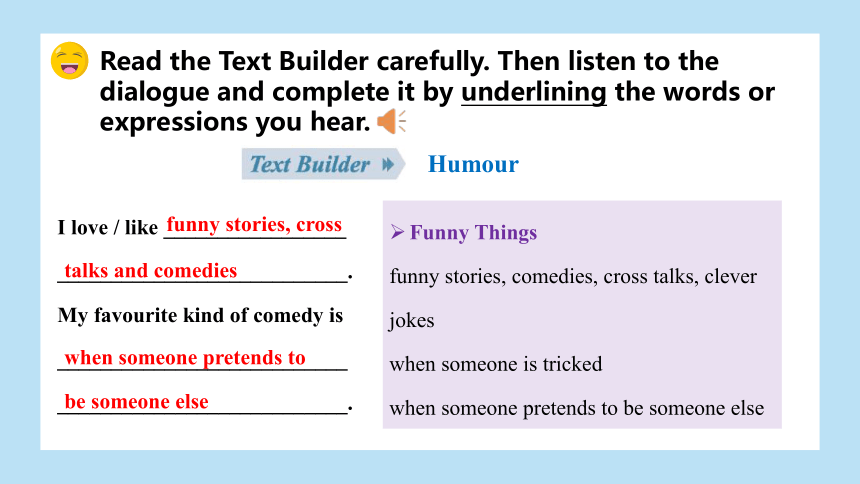
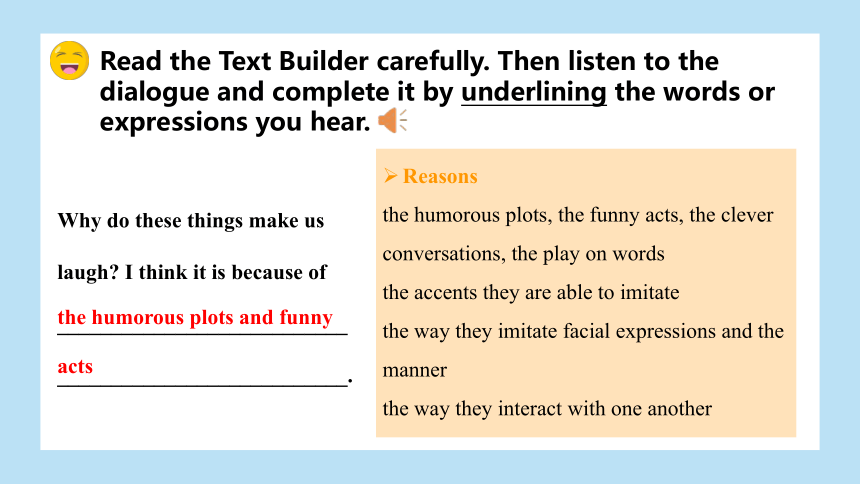
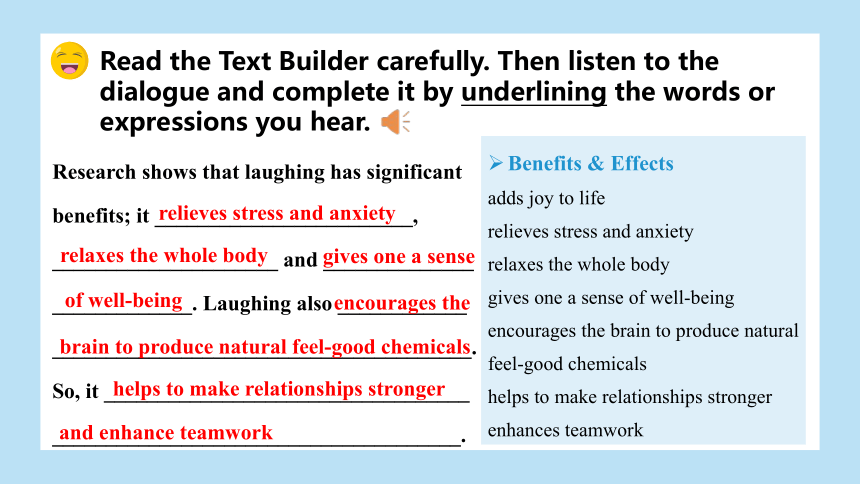
文档简介
(共37张PPT)
Unit 4
Humour
Topic Talk
Learning Objectives
PART. 01
Understand the daily study and life of British middle school students by watching videos. Based on your own daily study and life, compare the study and life in Chinese and British schools, and find out the similarities and differences between the two. Talk about your first impression of high school life, and have a preliminary perception of the study and life in the senior high school stage.
Learning Objectives
Extract key information (humour types, laughter benefits) from dialogues, improving the ability to understand spoken English about personal experiences and the effects of humour. Through pair/group work, discuss humour preferences, practice describing funny things and their reasons for laughter.
Explore cultural perspectives on humour. Understand how different cultures value laughter as a source of joy, stress relief, and relationship-building, recognizing universal and cultural-specific humour traits.
Analyze dialogues to understand personal stories and laughter’s effects, interpreting cause-effect relationships (e.g., funny acts → laughter → stress relief). In writing tasks, innovate by combining Text Builder elements with personal experiences, creating unique paragraphs about humour.
Use the Text Builder as a scaffold to organize thoughts, applying this strategy to discuss/present on humour. Practice listening for specific details to enhance targeted learning. By reflecting on personal humour experiences and writing independently, students develop self-study habits.
Understand the daily study and life of British middle school students by watching videos. Based on your own daily study and life, compare the study and life in Chinese and British schools, and find out the similarities and differences between the two. Talk about your first impression of high school life, and have a preliminary perception of the study and life in the senior high school stage.
Teaching Focuses and Anticipated Difficulties
Extract key information (humour types, laughter benefits) from dialogues, discuss humour preferences, and describe funny things in pair/group work.
Analyzing cause-effect in laughter’s effects, combining Text Builder elements with personal experiences in writing, and understanding cultural humour traits.
Lead-in
PART. 02
Watch the video. What does your laughter sound like
Topic Talk
PART. 03
Pair Work. Do you think it’s important that we laugh from time to time Why What makes you laugh Why does it make you laugh
Example: I think it’s important that we laugh from time to time, because ...
I think it is important that we laugh from time to time because it makes us relax/ it makes people feel good/ it boosts relationships/ it helps reduce embarrassment.
I find puns and sarcasm funny. I enjoy the play on words and their meanings.
Suggested answer
Listen to the dialogue and then choose the best answer.
1. What makes Ma Hua laugh
A. Funny stories and cross talks.
B. Comedies with false plots.
C. Stage plays in which someone pretends to be someone else.
2. Why do people laugh when they view cross talks or comedies in Ma Hua’s opinion
A. Because of the humorous plots and funny acts.
B. Because of the different ways of imitation.
C. Because of the special facial expressions.
3.What are they going to do next
A. To relax themselves. B. To watch a comedy. C. To imitate others.
Read the Text Builder carefully. Then listen to the dialogue and complete it by underlining the words or expressions you hear.
Humour
I love / like _________________
___________________________.
My favourite kind of comedy is ______________________________________________________.
Funny Things
funny stories, comedies, cross talks, clever jokes
when someone is tricked
when someone pretends to be someone else
funny stories, cross talks and comedies
when someone pretends to be someone else
Read the Text Builder carefully. Then listen to the dialogue and complete it by underlining the words or expressions you hear.
Why do these things make us laugh I think it is because of ______________________________________________________.
Reasons
the humorous plots, the funny acts, the clever
conversations, the play on words
the accents they are able to imitate
the way they imitate facial expressions and the
manner
the way they interact with one another
the humorous plots and funny acts
Read the Text Builder carefully. Then listen to the dialogue and complete it by underlining the words or expressions you hear.
Research shows that laughing has significant benefits; it ________________________, _____________________ and ______________
_____________. Laughing also ____________
_______________________________________. So, it __________________________________
______________________________________.
Benefits & Effects
adds joy to life
relieves stress and anxiety
relaxes the whole body
gives one a sense of well-being
encourages the brain to produce natural feel-good chemicals
helps to make relationships stronger
enhances teamwork
relieves stress and anxiety
gives one a sense of well-being
encourages the brain to produce natural feel-good chemicals
helps to make relationships stronger and enhance teamwork
relaxes the whole body
Listen again and fill in the blanks with the words you hear.
C: What makes you laugh, Ma Hua
M: There are so many things. I love funny stories and cross talks, and I also like comedies. My favourite kind of comedy is when someone __________ to be someone else.
C: Yes, I like that, too. But why do these things make us laugh
M: Well, I think it is because of the __________ plots and funny acts. When people ________ someone else, we laugh at the accents they are able to imitate, the way they imitate facial __________ and the manner of the people.
C: Do you know why it is good for us to laugh
M: Yes. Research shows that laughing has significant benefits: it relieves stress and anxiety, relaxes the whole body and gives one a sense of well-being.
C: That’s true.
M: You know, laughing also ___________ the brain to produce natural feel-good chemicals. So, it helps to make relationships stronger and __________ teamwork.
C: All this talk of laughter has made me want to watch something funny. Let’s go and find a comedy to watch!
pretends
humorous
imitate
expressions
encourages
enhance
Use the Text Builder to talk about humour and laughter, e.g. funny things you would like to watch and why they make you laugh.
Funny Things
Reasons
Benefits & Effects
Listen to the plete the diagram.
nose
help him up
embarrassed
to open up
a wild swing
collapsed
gathered himself
got up
Son, you’ve got real potential. That was an excellent hit
Listen again and role play with your partner.
D: You’ll never believe what happened to me, Jia Lan — I don’t think I’ll ever live it down.
J: Why, what happened, David
D: You know I’ve been learning to box. I had my first boxing match the other day and Mr Zhao was the referee — and you know what a strict teacher he is.
J: I know. We’re all terrified of him.
D: In the second round, I took such a hard hit from my opponent that I felt dizzy and unbalanced. I wasn’t sure where I was. In defence, I attacked back with a wild swing. It was so wild that instead of the hit landing on my opponent, it landed on Mr Zhao’s nose. As a result, he collapsed!
Listen again and role play with your partner.
J: Oh no! What happened then
D: I was shocked. I ran up to him and tried to help him up. I said sorry over and over again. He pushed me away, gathered himself and got up to his feet.
J: You must have felt so bad.
D: I was so embarrassed that I wanted the floor to open up and consume me.
J: And your opponent
D: He was confused and didn’t know if he should carry on hitting me, or stop and help Mr Zhao — so he just stood there.
J: And Mr Zhao — what happened then
D: He put his free hand on my shoulder and said, “Son, you’ve got real potential. That was an excellent hit!”
Use the language you have learnt to write a short paragraph about what you find funny and why we need humour.
Friends show their love in times of
trouble, not in happiness.
Euripides
Laughter makes you ten years younger.
— A Chinese proverb
Quote ... Unquote
笑一笑,十年少。
——中国谚语
Friends show their love in times of
trouble, not in happiness.
Euripides
Quote ... Unquote
A day without laughter is a day wasted.
— Charlie Chaplin
没有笑声的一天是浪费了的一天。
——查理·卓别林
Friends show their love in times of
trouble, not in happiness.
Euripides
Quote ... Unquote
Comedy is simply a funny way of being serious.
— Peter Ustinov
喜剧只是表现严肃的一种有趣方式。
——彼得·乌斯蒂诺夫
Friends show their love in times of
trouble, not in happiness.
Euripides
Quote ... Unquote
I don’t sit down to write a funny story. Every single thing I sit down to write is meant to be sad.
— Lorrie Moore
我坐下来不是为了写一个有趣的故事。我坐下来写的每一件事都是悲伤的。
——洛丽·摩尔
Friends show their love in times of
trouble, not in happiness.
Euripides
Share your understanding about these quotes.
These quotes collectively show the diverse roles that laughter, comedy, and emotional themes play in our lives and in creative works. Laughter is celebrated for its positive effects, comedy is recognized as a vehicle for serious messages, and some creative works find depth in exploring sadness.
Vocabulary
1. pretend
pretend to do... 假装做……
pretend to be doing... 假装正在做……
pretend to have done... 假装已经做过……
pretend to be+n./ adj. 假装是……
pretend (that)... 假装……
例题:
The man pretended ________(be) a leader but his funny behavior gave him away, which I think was the most humorous plot in this play.
to be
Vocabulary
2. anxiety
anxious adj. 忧虑的;不安的;渴望的
anxiously adv. 焦虑地;急切地
with anxiety 焦急地
be anxious for/about 担心……
be anxious to do... 渴望做……
例题:
You will get ________(anxiety) if there’s no mobile phone signal up the mountain.
anxious
Vocabulary
3. significant
significance n. 重要性;重要意义
significantly adv. 显著地;相当数量地
be significant =be of significance 很重要
attach significance to... 认为……重要
have great significance for... 对……有重大意义
例题:
I attach great significance to _________(strive) for goals, so we students must set goals and take action.
striving
Vocabulary
4. swing
swing round/around 突然转向
swing from... to... 从……转换到……
swing between... and... 在……和……之间转换
swing away 离开;去别处
例题:
Public opinion on the policy has swung from strong support ______ widespread criticism, as more people realize its hidden costs.
to
Vocabulary
5. embarrassed
embarrass vt. 使尴尬;使窘迫;使不安
embarrassing adj. 令人不安的;让人难堪的;令人尴尬的
embarrassment n. 尴尬;难堪
be embarrassed at/about 对……感到为难/尴尬
to one’s embarrassment 令人感到尴尬的是
例题:
He was embarrassed ______ how loudly he’d laughed during the movie, drawing the attention of the entire theater.
at
Vocabulary
6. confused
confusing adj. 令人困惑的;难懂的
confuse vt. 使糊涂;使迷惑
confusion n. 困惑;糊涂;混淆
be/get confused about... 对……感到困惑
confuse...with/and... 把……和……混淆
in confusion 困惑地;乱七八糟
例题:
He felt quite confused ________ the difficult question that was significant, his face blushing.
about
Exercise
PART. 04
1. The new software update is designed to e________(提高) the phone’s performance, making apps load faster and battery life last longer.
2. The actor practiced different f_______(面部的) expressions to show his character’s changing moods in the play.
3. The tourist’s thick Italian a_______(口音) made his questions hard to understand, but the locals smiled and tried to guess what he needed.
4. The small town has great p________(潜力) as a tourist destination, with its historic streets and unspoiled nature waiting to be explored.
nhance
Exercise: 单词拼写
acial
ccent
otential
1. Her __________(humor) stories about growing up on a farm always make the class laugh, turning even boring afternoons into lively ones.
2. Good teachers encourage ___________(interact) between students, using group discussions and team projects to help them learn from one another.
3. Overfishing has left the ocean’s ecosystem ____________(balance), with fewer predators leading to an explosion in smaller fish populations.
4. More ___________(consume) are choosing eco-friendly products, even if they cost more, to reduce their impact on the environment.
humorous
Exercise: 用所给词的适当形式填空
interaction
unbalanced
consumers
Summary
PART. 05
添加标题
ADD THE TITLE HERE
Topic Talk
Vocabulary
extract key information about humour types, laughter benefits from dialogues
master structural patterns for discussing humour
Listening
Quote
humour
pretend, anxiety, significant, swing, embarrassed, confused
Homework
PART. 06
Use the language you have learnt to write a short paragraph about what you find funny and why we need humour.
Homework
See you next class!
Unit 4
Humour
Topic Talk
Learning Objectives
PART. 01
Understand the daily study and life of British middle school students by watching videos. Based on your own daily study and life, compare the study and life in Chinese and British schools, and find out the similarities and differences between the two. Talk about your first impression of high school life, and have a preliminary perception of the study and life in the senior high school stage.
Learning Objectives
Extract key information (humour types, laughter benefits) from dialogues, improving the ability to understand spoken English about personal experiences and the effects of humour. Through pair/group work, discuss humour preferences, practice describing funny things and their reasons for laughter.
Explore cultural perspectives on humour. Understand how different cultures value laughter as a source of joy, stress relief, and relationship-building, recognizing universal and cultural-specific humour traits.
Analyze dialogues to understand personal stories and laughter’s effects, interpreting cause-effect relationships (e.g., funny acts → laughter → stress relief). In writing tasks, innovate by combining Text Builder elements with personal experiences, creating unique paragraphs about humour.
Use the Text Builder as a scaffold to organize thoughts, applying this strategy to discuss/present on humour. Practice listening for specific details to enhance targeted learning. By reflecting on personal humour experiences and writing independently, students develop self-study habits.
Understand the daily study and life of British middle school students by watching videos. Based on your own daily study and life, compare the study and life in Chinese and British schools, and find out the similarities and differences between the two. Talk about your first impression of high school life, and have a preliminary perception of the study and life in the senior high school stage.
Teaching Focuses and Anticipated Difficulties
Extract key information (humour types, laughter benefits) from dialogues, discuss humour preferences, and describe funny things in pair/group work.
Analyzing cause-effect in laughter’s effects, combining Text Builder elements with personal experiences in writing, and understanding cultural humour traits.
Lead-in
PART. 02
Watch the video. What does your laughter sound like
Topic Talk
PART. 03
Pair Work. Do you think it’s important that we laugh from time to time Why What makes you laugh Why does it make you laugh
Example: I think it’s important that we laugh from time to time, because ...
I think it is important that we laugh from time to time because it makes us relax/ it makes people feel good/ it boosts relationships/ it helps reduce embarrassment.
I find puns and sarcasm funny. I enjoy the play on words and their meanings.
Suggested answer
Listen to the dialogue and then choose the best answer.
1. What makes Ma Hua laugh
A. Funny stories and cross talks.
B. Comedies with false plots.
C. Stage plays in which someone pretends to be someone else.
2. Why do people laugh when they view cross talks or comedies in Ma Hua’s opinion
A. Because of the humorous plots and funny acts.
B. Because of the different ways of imitation.
C. Because of the special facial expressions.
3.What are they going to do next
A. To relax themselves. B. To watch a comedy. C. To imitate others.
Read the Text Builder carefully. Then listen to the dialogue and complete it by underlining the words or expressions you hear.
Humour
I love / like _________________
___________________________.
My favourite kind of comedy is ______________________________________________________.
Funny Things
funny stories, comedies, cross talks, clever jokes
when someone is tricked
when someone pretends to be someone else
funny stories, cross talks and comedies
when someone pretends to be someone else
Read the Text Builder carefully. Then listen to the dialogue and complete it by underlining the words or expressions you hear.
Why do these things make us laugh I think it is because of ______________________________________________________.
Reasons
the humorous plots, the funny acts, the clever
conversations, the play on words
the accents they are able to imitate
the way they imitate facial expressions and the
manner
the way they interact with one another
the humorous plots and funny acts
Read the Text Builder carefully. Then listen to the dialogue and complete it by underlining the words or expressions you hear.
Research shows that laughing has significant benefits; it ________________________, _____________________ and ______________
_____________. Laughing also ____________
_______________________________________. So, it __________________________________
______________________________________.
Benefits & Effects
adds joy to life
relieves stress and anxiety
relaxes the whole body
gives one a sense of well-being
encourages the brain to produce natural feel-good chemicals
helps to make relationships stronger
enhances teamwork
relieves stress and anxiety
gives one a sense of well-being
encourages the brain to produce natural feel-good chemicals
helps to make relationships stronger and enhance teamwork
relaxes the whole body
Listen again and fill in the blanks with the words you hear.
C: What makes you laugh, Ma Hua
M: There are so many things. I love funny stories and cross talks, and I also like comedies. My favourite kind of comedy is when someone __________ to be someone else.
C: Yes, I like that, too. But why do these things make us laugh
M: Well, I think it is because of the __________ plots and funny acts. When people ________ someone else, we laugh at the accents they are able to imitate, the way they imitate facial __________ and the manner of the people.
C: Do you know why it is good for us to laugh
M: Yes. Research shows that laughing has significant benefits: it relieves stress and anxiety, relaxes the whole body and gives one a sense of well-being.
C: That’s true.
M: You know, laughing also ___________ the brain to produce natural feel-good chemicals. So, it helps to make relationships stronger and __________ teamwork.
C: All this talk of laughter has made me want to watch something funny. Let’s go and find a comedy to watch!
pretends
humorous
imitate
expressions
encourages
enhance
Use the Text Builder to talk about humour and laughter, e.g. funny things you would like to watch and why they make you laugh.
Funny Things
Reasons
Benefits & Effects
Listen to the plete the diagram.
nose
help him up
embarrassed
to open up
a wild swing
collapsed
gathered himself
got up
Son, you’ve got real potential. That was an excellent hit
Listen again and role play with your partner.
D: You’ll never believe what happened to me, Jia Lan — I don’t think I’ll ever live it down.
J: Why, what happened, David
D: You know I’ve been learning to box. I had my first boxing match the other day and Mr Zhao was the referee — and you know what a strict teacher he is.
J: I know. We’re all terrified of him.
D: In the second round, I took such a hard hit from my opponent that I felt dizzy and unbalanced. I wasn’t sure where I was. In defence, I attacked back with a wild swing. It was so wild that instead of the hit landing on my opponent, it landed on Mr Zhao’s nose. As a result, he collapsed!
Listen again and role play with your partner.
J: Oh no! What happened then
D: I was shocked. I ran up to him and tried to help him up. I said sorry over and over again. He pushed me away, gathered himself and got up to his feet.
J: You must have felt so bad.
D: I was so embarrassed that I wanted the floor to open up and consume me.
J: And your opponent
D: He was confused and didn’t know if he should carry on hitting me, or stop and help Mr Zhao — so he just stood there.
J: And Mr Zhao — what happened then
D: He put his free hand on my shoulder and said, “Son, you’ve got real potential. That was an excellent hit!”
Use the language you have learnt to write a short paragraph about what you find funny and why we need humour.
Friends show their love in times of
trouble, not in happiness.
Euripides
Laughter makes you ten years younger.
— A Chinese proverb
Quote ... Unquote
笑一笑,十年少。
——中国谚语
Friends show their love in times of
trouble, not in happiness.
Euripides
Quote ... Unquote
A day without laughter is a day wasted.
— Charlie Chaplin
没有笑声的一天是浪费了的一天。
——查理·卓别林
Friends show their love in times of
trouble, not in happiness.
Euripides
Quote ... Unquote
Comedy is simply a funny way of being serious.
— Peter Ustinov
喜剧只是表现严肃的一种有趣方式。
——彼得·乌斯蒂诺夫
Friends show their love in times of
trouble, not in happiness.
Euripides
Quote ... Unquote
I don’t sit down to write a funny story. Every single thing I sit down to write is meant to be sad.
— Lorrie Moore
我坐下来不是为了写一个有趣的故事。我坐下来写的每一件事都是悲伤的。
——洛丽·摩尔
Friends show their love in times of
trouble, not in happiness.
Euripides
Share your understanding about these quotes.
These quotes collectively show the diverse roles that laughter, comedy, and emotional themes play in our lives and in creative works. Laughter is celebrated for its positive effects, comedy is recognized as a vehicle for serious messages, and some creative works find depth in exploring sadness.
Vocabulary
1. pretend
pretend to do... 假装做……
pretend to be doing... 假装正在做……
pretend to have done... 假装已经做过……
pretend to be+n./ adj. 假装是……
pretend (that)... 假装……
例题:
The man pretended ________(be) a leader but his funny behavior gave him away, which I think was the most humorous plot in this play.
to be
Vocabulary
2. anxiety
anxious adj. 忧虑的;不安的;渴望的
anxiously adv. 焦虑地;急切地
with anxiety 焦急地
be anxious for/about 担心……
be anxious to do... 渴望做……
例题:
You will get ________(anxiety) if there’s no mobile phone signal up the mountain.
anxious
Vocabulary
3. significant
significance n. 重要性;重要意义
significantly adv. 显著地;相当数量地
be significant =be of significance 很重要
attach significance to... 认为……重要
have great significance for... 对……有重大意义
例题:
I attach great significance to _________(strive) for goals, so we students must set goals and take action.
striving
Vocabulary
4. swing
swing round/around 突然转向
swing from... to... 从……转换到……
swing between... and... 在……和……之间转换
swing away 离开;去别处
例题:
Public opinion on the policy has swung from strong support ______ widespread criticism, as more people realize its hidden costs.
to
Vocabulary
5. embarrassed
embarrass vt. 使尴尬;使窘迫;使不安
embarrassing adj. 令人不安的;让人难堪的;令人尴尬的
embarrassment n. 尴尬;难堪
be embarrassed at/about 对……感到为难/尴尬
to one’s embarrassment 令人感到尴尬的是
例题:
He was embarrassed ______ how loudly he’d laughed during the movie, drawing the attention of the entire theater.
at
Vocabulary
6. confused
confusing adj. 令人困惑的;难懂的
confuse vt. 使糊涂;使迷惑
confusion n. 困惑;糊涂;混淆
be/get confused about... 对……感到困惑
confuse...with/and... 把……和……混淆
in confusion 困惑地;乱七八糟
例题:
He felt quite confused ________ the difficult question that was significant, his face blushing.
about
Exercise
PART. 04
1. The new software update is designed to e________(提高) the phone’s performance, making apps load faster and battery life last longer.
2. The actor practiced different f_______(面部的) expressions to show his character’s changing moods in the play.
3. The tourist’s thick Italian a_______(口音) made his questions hard to understand, but the locals smiled and tried to guess what he needed.
4. The small town has great p________(潜力) as a tourist destination, with its historic streets and unspoiled nature waiting to be explored.
nhance
Exercise: 单词拼写
acial
ccent
otential
1. Her __________(humor) stories about growing up on a farm always make the class laugh, turning even boring afternoons into lively ones.
2. Good teachers encourage ___________(interact) between students, using group discussions and team projects to help them learn from one another.
3. Overfishing has left the ocean’s ecosystem ____________(balance), with fewer predators leading to an explosion in smaller fish populations.
4. More ___________(consume) are choosing eco-friendly products, even if they cost more, to reduce their impact on the environment.
humorous
Exercise: 用所给词的适当形式填空
interaction
unbalanced
consumers
Summary
PART. 05
添加标题
ADD THE TITLE HERE
Topic Talk
Vocabulary
extract key information about humour types, laughter benefits from dialogues
master structural patterns for discussing humour
Listening
Quote
humour
pretend, anxiety, significant, swing, embarrassed, confused
Homework
PART. 06
Use the language you have learnt to write a short paragraph about what you find funny and why we need humour.
Homework
See you next class!
同课章节目录
- Unit 4 Humour
- Lesson 1 What’s So Funny?
- Lesson 2 Why Do We Need Humour?
- Lesson 3 My Favourite Comedian
- Unit 5 Education
- Lesson 1 Enlightening a Mind
- Lesson 2 The Objectives of Education
- Lesson 3 Understanding
- Unit 6 The Media
- Lesson 1 From Page to Screen
- Lesson 2 Questions about Media
- Lesson 3 The Advertising Game
